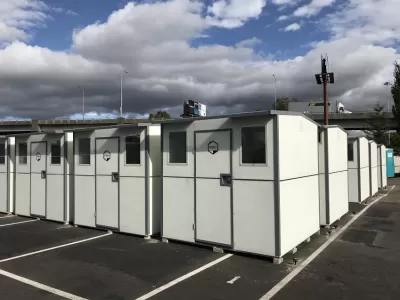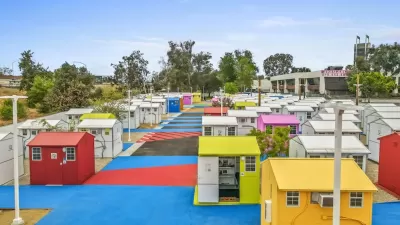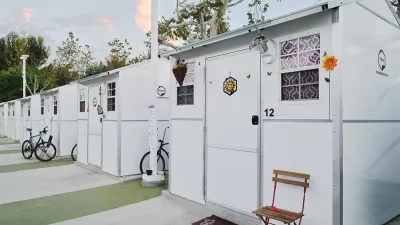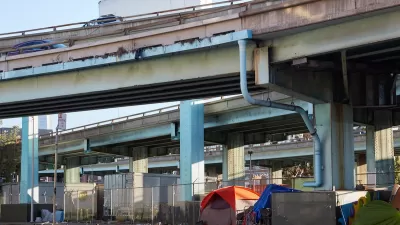'Tiny home villages' were touted as a quick, if temporary, solution to California's housing crisis, but a series of fires is raising concern about their safety.

A recent fire in a 'tiny home village' for unhoused people in Oakland is prompting questions about the safety and sustainability of these projects as a temporary stopgap in California's homelessness crisis, writes Alissa Walker in Curbed. "The structures, made by a Seattle-area company called Pallet, are currently being used as shelter for formerly unhoused residents in at least 70 villages in the U.S., according to a representative for the company."
The Oakland incident adds to a list of other fires in Pallet-built developments: "In October 2020, four Pallet shelters burned down and two were badly damaged in the Los Guilicos Village in Santa Rosa, California, when a wildfire encroached on the 60-shelter property. In December 2020, 20 Pallet shelters burned down in the Ramsey Street Village in Banning, California, displacing 40 people." The company later made changes in the materials it uses, though it denied that the changes were related to fire protection.
"Pallet’s shelters are equipped with smoke detectors, CO monitors, fire extinguishers, and an emergency exit panel, the company’s spokesperson Brandon Bills says." But according to fire marshall Lauren Andrade, the small size of the units (which, in some cases, house two residents each) is a major concern. "If it’s packed to the top, that will put out a lot of BTUs and spread quicker," says Andrade in the article.
Walker notes that "In California, where cities are doubling down on the criminalization of homelessness without creating enough permanent units for the unhoused, the tiny-home fix is hardly sustainable." The dubious safety and long-term viability of tiny home villages highlights the need for other, more long-term options for supportive housing.
FULL STORY: Tiny-Home Fires Raise Bigger Questions About Housing for Homeless

Planetizen Federal Action Tracker
A weekly monitor of how Trump’s orders and actions are impacting planners and planning in America.

Congressman Proposes Bill to Rename DC Metro “Trump Train”
The Make Autorail Great Again Act would withhold federal funding to the system until the Washington Metropolitan Area Transit Authority (WMATA), rebrands as the Washington Metropolitan Authority for Greater Access (WMAGA).

The Simple Legislative Tool Transforming Vacant Downtowns
In California, Michigan and Georgia, an easy win is bringing dollars — and delight — back to city centers.

The States Losing Rural Delivery Rooms at an Alarming Pace
In some states, as few as 9% of rural hospitals still deliver babies. As a result, rising pre-term births, no adequate pre-term care and "harrowing" close calls are a growing reality.

The Small South Asian Republic Going all in on EVs
Thanks to one simple policy change less than five years ago, 65% of new cars in this Himalayan country are now electric.

DC Backpedals on Bike Lane Protection, Swaps Barriers for Paint
Citing aesthetic concerns, the city is removing the concrete barriers and flexposts that once separated Arizona Avenue cyclists from motor vehicles.
Urban Design for Planners 1: Software Tools
This six-course series explores essential urban design concepts using open source software and equips planners with the tools they need to participate fully in the urban design process.
Planning for Universal Design
Learn the tools for implementing Universal Design in planning regulations.
Smith Gee Studio
City of Charlotte
City of Camden Redevelopment Agency
City of Astoria
Transportation Research & Education Center (TREC) at Portland State University
US High Speed Rail Association
City of Camden Redevelopment Agency
Municipality of Princeton (NJ)





























